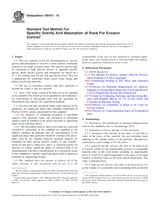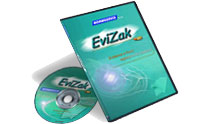Wir benötigen Ihre Einwilligung zur Verwendung der einzelnen Daten, damit Sie unter anderem Informationen zu Ihren Interessen einsehen können. Klicken Sie auf "OK", um Ihre Zustimmung zu erteilen.
ASTM D6473-15
Standard Test Method For Specific Gravity And Absorption of Rock For Erosion Control
Automatische name übersetzung:
Standard Test Method for Spezifisches Gewicht und Absorption von Rock For Erosionskontrolle
NORM herausgegeben am 1.7.2015
Informationen über die Norm:
Bezeichnung normen: ASTM D6473-15
Anmerkung: UNGÜLTIG
Ausgabedatum normen: 1.7.2015
SKU: NS-611288
Zahl der Seiten: 4
Gewicht ca.: 12 g (0.03 Pfund)
Land: Amerikanische technische Norm
Kategorie: Technische Normen ASTM
Kategorie - ähnliche Normen:
Die Annotation des Normtextes ASTM D6473-15 :
Keywords:
absorption, riprap, rock material properties, specific gravity,, ICS Number Code 13.080.01 (Soil quality in general)
Ergänzende Informationen
| Significance and Use | ||||||||||||
|
5.1 Rock riprap and armor stone are composed of pieces of natural rock that are placed on construction projects, shorelines, streambeds, bridge abutments, pilings, and other structures to minimize the effects of erosion. The ability of rock to withstand deterioration from weathering affects both the effectiveness of the project and its cost. The specific gravity and absorption of rock provide useful information that can be used in evaluating possible deterioration of rock. 5.2 Bulk specific gravity and bulk specific gravity SSD may reflect the quality of rock and is important in that it may provide one indicator to the resistance of a rock to movement by water. 5.3 The absorption of water into rock may affect its durability under freezing conditions and salt crystallization conditions. In addition, the absorption test has been used as an index test in determining whether additional tests are needed to evaluate the durability of a rock. 5.4 Test specimens equal in size to the proposed design size would provide the best correlations between laboratory tests and actual field performance, however this is usually neither practical nor economically feasible. 5.5 The results of these tests are not to be used as the sole basis for determination of rock durability, but should be used in conjunction with the results of other tests. 5.6 These test methods have been used to evaluate different types of rocks. There have been rare occasions when test results have provided data that have not agreed with the durability of rock under actual field conditions. For example, some rocks with low absorption values have fragmented in actual usage and some with high absorption values have proven to be durable. Note 2: The quality of the result produced by this standard is
dependent on the competence of the personnel performing it, and the
suitability of the equipment and facilities used. Agencies which
meet the criteria of Practice D3740 are generally considered capable of
competent and objective testing/sampling/inspection/etc. Users of
this standard are cautioned that compliance with Practice
D3740 does not in itself
assure reliable results. Reliable results depends on many factors;
Practice D3740 provides a
means of evaluating some of those factors.
|
||||||||||||
| 1. Scope | ||||||||||||
|
1.1 This test method covers the determination of specific gravity and absorption of rock for erosion control, commonly referred to as riprap or armor stone. The specific gravity may be expressed as bulk specific gravity or apparent specific gravity. Bulk specific gravity and absorption are based on a 24 ± 4-h soaking time for the rock specimens tested. This test is appropriate for breakwater stone, armor stone, riprap, and gabion sized rock materials. 1.2 The use of reclaimed concrete and other materials is beyond the scope of this test method. 1.3 Units—The values stated in SI units are to be regarded as the standard. The values given in parentheses are mathematical conversions to inch-pound units that are provided for information only and are not considered standard. 1.4 All observed and calculated values shall conform to the guidelines for significant digits and rounding established in Practice D6026, unless superseded by this standard. 1.4.1 For purposes of comparing measured or calculated value(s) with specified limits, the measured or calculated value(s) shall be rounded to the nearest decimal or significant digits in the specified limits. 1.4.2 The procedures used to specify how data are collected/recorded or calculated, in this standard are regarded as the industry standard. In addition, they are representative of the significant digits that generally should be retained. The procedures used do not consider material variation, purpose for obtaining the data, special purpose studies, or any considerations for the user’s objectives; and it is common practice to increase or reduce significant digits of reported data to be commensurate with these considerations. It is beyond the scope of this standard to consider significant digits used in analytical methods for engineering design. 1.5 This standard does not purport to address all of the safety concerns, if any, associated with its use. It is the responsibility of the user of this standard to establish appropriate safety and health practices and determine the applicability of regulatory limitations prior to use. |
||||||||||||
| 2. Referenced Documents | ||||||||||||
|
Ähnliche Normen:
Historisch
1.8.2012
Historisch
15.2.2010
Historisch
15.6.2013
Historisch
1.7.2010
Historisch
1.10.2008
Historisch
1.5.2013
Empfehlungen:
EEviZak – alle Gesetze einschließlich ihrer Evidenz in einer Stelle
Bereitstellung von aktuellen Informationen über legislative Vorschriften in der Sammlung der Gesetze bis zum Jahr 1945.
Aktualisierung 2x pro Monat!
Brauchen Sie mehr Informationen? Sehen Sie sich diese Seite an.



 ASTM D7047-12
ASTM D7047-12 ASTM D7099-04(2010)..
ASTM D7099-04(2010).. ASTM D7101-13
ASTM D7101-13 ASTM D7262-10
ASTM D7262-10 ASTM E1945-02(2008)..
ASTM E1945-02(2008).. ASTM E2876-13
ASTM E2876-13
 Cookies
Cookies
